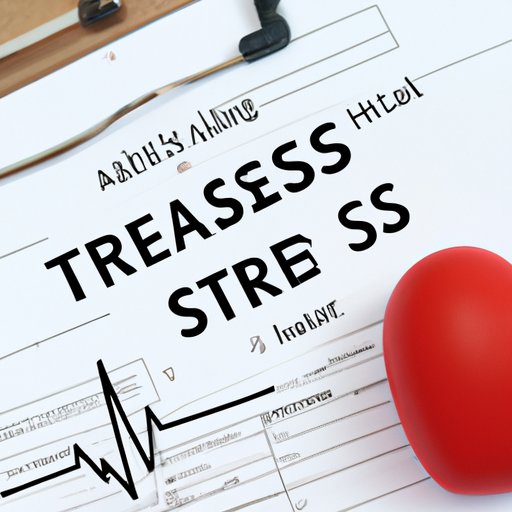
Introduction
Stress tests are commonly used to diagnose heart conditions and diseases, and although they are generally safe, understanding what happens if they fail is crucial to maintaining heart health. In this article, we’ll explore the basics of stress tests, common reasons for failure, consequences of a failed stress test, and preventative measures to avoid a failed test. We’ll also discuss coping strategies for the emotional impact of failing a stress test and strategies to build a heart-healthy lifestyle.
The Basics of a Stress Test
A stress test, also known as an exercise or cardiac stress test, is a non-invasive diagnostic tool used to evaluate the heart’s ability to respond to physical activity and stress. The test is generally performed in a hospital or clinic, and involves the use of an EKG machine to monitor the heart’s electrical activity.
The purpose of a stress test is to assess the overall health of the heart, including blood flow, heart rate, and rhythm. By measuring the heart’s performance under stress, doctors can diagnose various heart conditions, such as coronary artery disease and arrhythmias.
Common Reasons for Failing a Stress Test
There are several reasons why an individual may fail a stress test, including heart conditions and diseases. Certain heart conditions, such as aortic stenosis, hypertrophic cardiomyopathy, and unstable angina, can cause the heart to perform poorly during a stress test.
Other factors that may affect the results of a stress test include age, sex, medications, and overall fitness level. For example, individuals taking medications that slow the heart rate or blood pressure may not undergo an accurate stress test.
A failed stress test can indicate a variety of heart conditions, including blocked arteries, heart valve problems, and arrhythmias. It’s important to note that a failed stress test does not necessarily mean that an individual has heart disease – it simply indicates the need for further testing and evaluation.
Different Types of Stress Tests
There are three main types of stress tests: exercise stress tests, chemical stress tests, and nuclear stress tests. Each test is designed to measure the heart’s performance in different ways.
An exercise stress test involves walking on a treadmill or pedaling a stationary bike, while the heart’s performance is monitored by an EKG machine. The goal is to gradually increase the heart rate over time, to determine how well the heart responds to physical activity.
A chemical stress test is similar to an exercise stress test, but instead of physical activity, a special drug is used to increase the heart rate and simulate the effects of exercise on the heart.
A nuclear stress test involves the injection of a radioactive tracer into the bloodstream, which enables doctors to create images of blood flow in the heart. This test is often used when an exercise or chemical stress test doesn’t provide enough information about the heart’s condition.
Consequences of Failing a Stress Test
If an individual fails a stress test, further testing and evaluation may be necessary to diagnose any potential heart conditions. In some cases, additional procedures and surgeries may be required to treat underlying heart disease.
Additionally, a failed stress test can be a wake-up call for individuals to take their heart health more seriously. This may involve making lifestyle changes, such as quitting smoking or adopting a heart-healthy diet and exercise routine, to reduce the risk of heart disease.
Preventative Measures for Avoiding a Failed Stress Test
The best way to avoid a failed stress test is to maintain a heart-healthy lifestyle. This includes engaging in regular exercise, eating a well-balanced diet, and managing stress levels.
Regular exercise, including activities such as walking, cycling, and swimming, can improve overall cardiovascular health and reduce the risk of heart disease. Eating a diet rich in fruits, vegetables, whole grains, and lean protein can also improve heart health and reduce the risk of heart disease.
Managing stress levels through relaxation techniques, such as deep breathing exercises and meditation, can help lower blood pressure and reduce the risk of heart disease. Additionally, avoiding or quitting smoking, reducing alcohol intake, and maintaining a healthy weight can all contribute to a healthy heart.
Coping with the Emotional Impact of Failing a Stress Test
A failed stress test can be an emotional and stressful experience, especially if it leads to a diagnosis of heart disease. It’s important to utilize healthy coping strategies to manage stress and anxiety.
Some effective coping strategies include regular exercise, talking to a therapist or counselor, practicing relaxation techniques, and maintaining social connections. It’s also important to take care of oneself through self-care practices such as getting enough sleep, eating a nutritious diet, and engaging in activities that bring joy and happiness.
Strategies for Building a Heart-Healthy Lifestyle
In addition to preventative measures, there are additional strategies individuals can implement to build a heart-healthy lifestyle. These include:
– Engaging in physical activity for at least 30 minutes a day, most days of the week.
– Eating a diet rich in fruits, vegetables, whole grains, and lean protein.
– Monitoring cholesterol levels and blood pressure regularly.
– Practicing stress management techniques regularly.
– Avoiding or quitting smoking.
Conclusion
Understanding what happens if you fail a stress test is crucial to maintaining heart health. By following preventative measures and building a heart-healthy lifestyle, individuals can reduce the risk of heart disease and avoid a failed stress test. It’s important to seek medical attention if you experience symptoms of heart disease, and to reach out to support systems and resources for coping with the emotional impact of a failed stress test.




